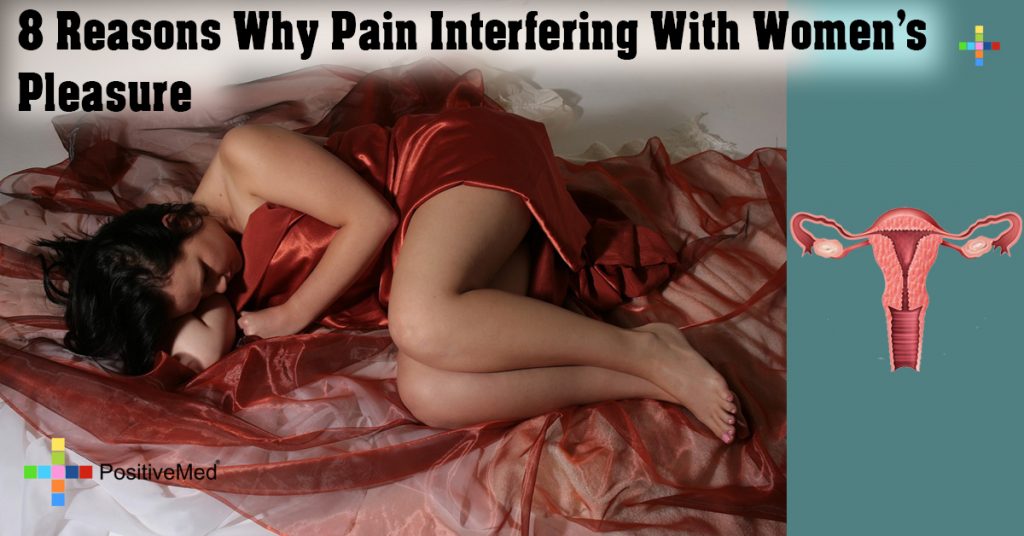
8 Reasons Why Pain Interfering With Women’s Pleasure
Dyspareunia refers to the pain experienced during or after friendly connection. For most women, this pain is experienced earlier on in their romantic lives or later around menopause. A National survey carried out in 2009 of lady health and behavior revealed that 30 % of women experience pain during their most recent physical encounter. However, the common nature of this experience does not make it normal or okay.
Pain is your body’s way of warning you that something is wrong so you can step back and figure out what that is. While many of the causes of Dyspareunia are not deadly or serious, all have detrimental effects on one’s experience. This pain often causes women to be extremely nervous about engaging in coitus that makes them dry during the encounter leading to more pain. Here are some reasons why women experience pain during coitus.
1. Not enough lubrication
Without arousal, coitus may be extremely painful. The tissues require lubrication to allow for easy penetration. The simplest way to work around this is to increase time allocated for foreplay. After all, it takes 5 to 7 minutes after the brain is woke up for the lady private part tissue to be sufficiently lubricated.
RELATED ARTICLE: This Woman Shares Her Method Of Curing Bacterial V At Home
It would also be prudent to avoid warm baths or showers because these can dry lady private part secretions. A tube of lube can come in handy so be sure to have one around, so you don’t have to ruin the moment by going in search of one in the middle of the excitement. Silicone based lubricants are better than water based ones since they are slicker.
2. Genital Infections
Having coitus with a genital infection is often very unpleasant. Genital herpes, yeast infections, and trichomoniasis are just a few of the infections that women may experience that cause this pain. Dr. Deborah Coady, M.D., a New York City ob-gyn and author of Healing Painful relation says that these infections, which are often easy to treat, may be aggravated by coitus.
The best solution for this is to seek medical attention as soon as possible and avoid coitus while undergoing treatment for such infections.
3. Irritable Bowel Syndrome
Women suffering from this condition may experience the following symptoms along with pain during coitus: cyclic constipation, diarrhea, and intestinal cramping.
This condition is manageable through medication, dieting, behavioral therapy and reduction of stress. It is advisable to see a physician if you are experiencing these symptoms along with the pain. Treatment of IBs often reduces lady private part pain during coitus.
4. Endometriosis
This is a condition common among young women whereby the tissue lining the uterus become embedded in other parts of the body such as in the ovaries, fallopian tubes, and cervix. The condition becomes apparent only after one stops using the contraceptive pill for the first time. This pill is a treatment for the condition and thus suppresses it. A 2014 study by the Journal of Medicine revealed that 75 % of women suffering from this condition experience pain with deep penetration that persists even after penetration.
The only solution to this problem is to undergo laparoscopic surgery. However, it is very difficult to identify the source of the pain experienced. Painful periods that run in families can be a good indicator of this condition. If you have such experiences within your family, it would be wise to visit a doctor as soon as possible.
5. Pelvic Inflammatory Disease
This condition is characterized by inflammation of the fallopian tubes, uterus, and ovaries. The pain experienced during coitus by women with this condition is often caused by the movement of these inflamed organs. The deeper the penetration, the more pain experienced. However, the pain subsides as penetration stops. Other symptoms of this condition include honey pot discharge and fever.
Women experiencing these symptoms should seek medical attention immediately and avoid having relations during treatment.
6. Stress
While stress itself may not cause physical pain during coitus, it may trigger tension that could result in pain. Anxiety often causes the pH of the Honey pot to change which can lead to bacterial infections such as yeast. A really bad case of anxiety could also cause muscle spasms on your pelvic floor and even reduce your overall tolerance of pain.
RELATED ARTICLE: Your Gynecologist Wishes You’d Stop Doing THESE 9 Things
This is why it is very important to distress before getting down and dirty. Give each other massages is a great way to start. Yoga is also effective for people that don’t feel comfortable with giving or receiving massages.
7. It’s too tight
There may be instances where your partner is way too large for you, or you are way too small for him, and this is causing you pain. There is nothing to be embarrassed about.
Changing positions during coitus may help reduce the pain caused by the uncomfortable stretch. Don’t be afraid to get on top. This way you control the pace and depth of the thrusting and reduce your pain. Using lubricants may also help in such instances.
8. Vaginismus
This is whereby the muscles around the lady private part contract painfully making penetration extremely painful. The spasms of vaginismus are involuntary but may become a protective reflex after a painful experience.
For women experiencing this, it is advisable to seek help to break the cycle of fear, anxiety and pain.
While dyspareunia may grossly affect your experience during coitus, you need not continue suffering. Most of the causes have simple solutions and can thus be averted. However, it is important to remember to seek medical attention if these problems persist, especially where other symptoms are being experienced as well.





